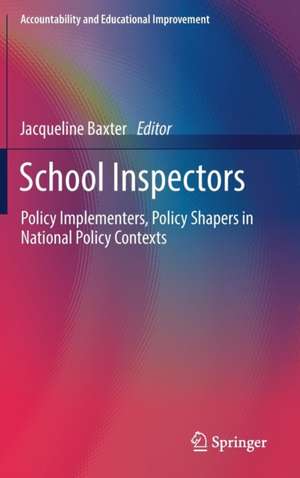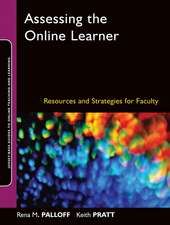School Inspectors: Policy Implementers, Policy Shapers in National Policy Contexts: Accountability and Educational Improvement
Editat de Jacqueline Baxteren Limba Engleză Hardback – 21 apr 2017
Inspection policy can have various unintended consequences, some of which produce radical discrepancies between the policy intent and its implementation. A number of these discrepancies derive from the way in which the policy is articulated while others derive from the ways in which inspectors interpret and operationalise this policy. This implementation is coloured and conditioned by several factors, including the evidence on which inspectors base their judgements; what counts as evidence in different policy contexts; what counts as valid knowledge in inspection processes; the qualities needed by inspectors working in differing policy contexts and the identities that they adopt in order to successfully carry out their work. The book provides a valuable contribution to our understanding of the politics and practices which colour and shape the legitimacy and operational execution of inspection policy. The work is unique in its focus on the inspectors’ role within the implementation of the inspection process— an element often overlooked in the literature. It also includes two chapters co-written by inspectors, offering unique insights into their life worlds and identities.
| Toate formatele și edițiile | Preț | Express |
|---|---|---|
| Paperback (1) | 696.82 lei 6-8 săpt. | |
| Springer International Publishing – 18 iul 2018 | 696.82 lei 6-8 săpt. | |
| Hardback (1) | 732.70 lei 6-8 săpt. | |
| Springer International Publishing – 21 apr 2017 | 732.70 lei 6-8 săpt. |
Preț: 732.70 lei
Preț vechi: 893.54 lei
-18% Nou
Puncte Express: 1099
Preț estimativ în valută:
140.20€ • 146.68$ • 116.47£
140.20€ • 146.68$ • 116.47£
Carte tipărită la comandă
Livrare economică 03-17 aprilie
Preluare comenzi: 021 569.72.76
Specificații
ISBN-13: 9783319525358
ISBN-10: 3319525352
Pagini: 310
Ilustrații: XVIII, 275 p. 14 illus.
Dimensiuni: 155 x 235 x 18 mm
Greutate: 0.59 kg
Ediția:1st ed. 2017
Editura: Springer International Publishing
Colecția Springer
Seria Accountability and Educational Improvement
Locul publicării:Cham, Switzerland
ISBN-10: 3319525352
Pagini: 310
Ilustrații: XVIII, 275 p. 14 illus.
Dimensiuni: 155 x 235 x 18 mm
Greutate: 0.59 kg
Ediția:1st ed. 2017
Editura: Springer International Publishing
Colecția Springer
Seria Accountability and Educational Improvement
Locul publicării:Cham, Switzerland
Cuprins
1. School Inspectors as Policy Implementers: Influences and Activities.- 2. Changing Policies – Changing Inspection Practices? Or the Other Way Round? – 3. Different Systems, Different Identities: The Work of Inspectors in Sweden and England.- 4. Inspectors and the Process of Self-Evaluation in Ireland.-5. Feedback by Dutch Inspectors to Schools.- 6. Making a Difference? The Voices of School Inspectors and Managers in Sweden.- 7. Headteachers Who also Inspect: Practitioner Inspectors in England.- 8. Knowing Inspectors’ Knowledge: Forms and Transformations.- 9. Framing the Debate: Influencing Public Opinion of Inspection, Inspectors and Academy Policy: The Role of the Media.- 10. The Short Flourishing of an Inspection System.- 11. What Stated Aims Should School Inspection Pursue? - Views of Inspectors, Policy-makers and Practitioners.- 12. School Inspectors: Shaping and Evolving Policy Understandings.
Textul de pe ultima copertă
This book examines the role of the inspector within the context of a number of OECD member states and explores the ways in which the inspectors themselves interpret, implement and influence inspection practices and policy.
Inspection policy can have various unintended consequences, some of which produce radical discrepancies between the policy intent and its implementation. A number of these discrepancies derive from the way in which the policy is articulated while others derive from the ways in which inspectors interpret and operationalise this policy. This implementation is coloured and conditioned by several factors, including the evidence on which inspectors base their judgements; what counts as evidence in different policy contexts; what counts as valid knowledge in inspection processes; the qualities needed by inspectors working in differing policy contexts and the identities that they adopt in order to successfully carry out their work. The book provides a valuable contribution to our understanding of the politics and practices which colour and shape the legitimacy and operational execution of inspection policy. The work is unique in its focus on the inspectors’ role within the implementation of the inspection process— an element often overlooked in the literature. It also includes two chapters co-written by inspectors, offering unique insights into their life worlds and identities.
Inspection policy can have various unintended consequences, some of which produce radical discrepancies between the policy intent and its implementation. A number of these discrepancies derive from the way in which the policy is articulated while others derive from the ways in which inspectors interpret and operationalise this policy. This implementation is coloured and conditioned by several factors, including the evidence on which inspectors base their judgements; what counts as evidence in different policy contexts; what counts as valid knowledge in inspection processes; the qualities needed by inspectors working in differing policy contexts and the identities that they adopt in order to successfully carry out their work. The book provides a valuable contribution to our understanding of the politics and practices which colour and shape the legitimacy and operational execution of inspection policy. The work is unique in its focus on the inspectors’ role within the implementation of the inspection process— an element often overlooked in the literature. It also includes two chapters co-written by inspectors, offering unique insights into their life worlds and identities.
Caracteristici
Examines the role of the school inspector within the inspection process, offering valuable insights into the politics of inspection policy implementation Provides a valuable contribution to our understanding of the ways in which inspectors influence the execution of inspection policy Explores several accountability regimes throughout OECD member states and how these regimes play out operationally within different cultural and policy contexts Examines the role of international drivers such as PISA and their impact on the changing role of inspection in OECD member states Includes supplementary material: sn.pub/extras











